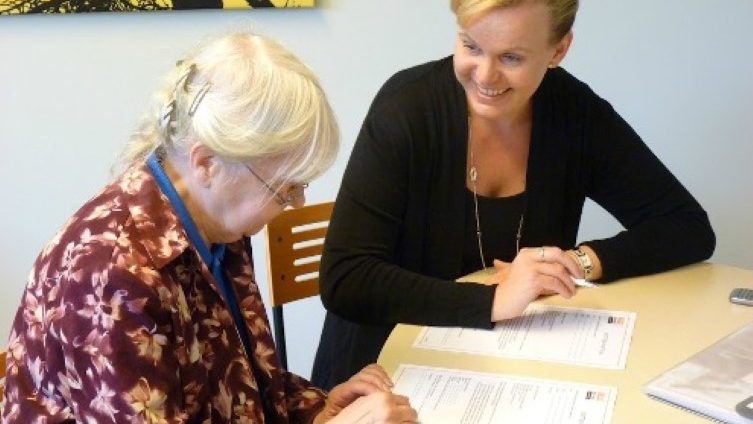“Volunteers call older people from their own homes using mobile phones provided by the project. Participation is free of charge to both the volunteers and the older people benefiting from the service,” says Tiina Hast, one of the project workers from Päijät-Hämeen hyvinvointipalvelujen kehitys ry.
This association, developing well-being services in the Päijät-Häme area, has offered counselling to ageing people for many years. The need for mental support has been growing constantly, and the telephone service project was created as an answer to this need. The association sought an example for the operating model from Ireland, which suffers from similar problems associated with the loneliness of the elderly.
Friendship by telephone
Project worker Tiina Hast recruits and trains volunteers to serve as friends for older people. On the basis of interviews, a volunteer is selected for each person benefiting from the service, who is the customer. In accordance with a call plan, the volunteer makes a short check-up call every day or less frequently, but then to have a longer chat.
The aim is to recruit trained volunteers in every municipality in the region. The volunteers are mainly older people themselves, the youngest one being 58 and the oldest 90 at the moment. “The best CV for a volunteer is long life experience,” Hast emphasises.
The strength of the project lies in the professional and reliable background organisation, with the help of which friendly and confidential telephone counselling and social support of high quality is developed for and provided to people who feel themselves isolated or lonely.
“Ageing people are also taught how to use modern communications technology,” says Hast, describing the operations.
Nieminen and Hast talk about empowerment, removal of obstacles, and peer support.“We do not provide crisis assistance, but volunteers learn how to recognise a crisis situation and steer the matter forward. Volunteers are not professionals, but they do learn professional skills.”
Finding the loneliest people
The customers in the project are older people who have joined through various channels. Information on the service has been distributed through home care, parishes and associations, and at health kiosks. People have also contacted the project after the activity has been featured in newspapers or on radio.
The project operates in the Päijät-Häme region, but the organisers learned about the operating model from Ireland, where volunteers gather in a centre to make the phone calls. “By going to Ireland to learn about the activity, we saved at least six months in getting the project started,” estimates Nieminen.
The problems are the same in Ireland, such as the difficulties with mobility that older people have and the ongoing cultural change. “We have adopted many things learned in Ireland for the project, but there are also differences. Here, volunteers receive a telephone from the project and make the calls from their own homes. This keeps the threshold of volunteering as low as possible, and makes it possible for, for example, people with physical impairments to volunteer.”
The basic idea is to spread high spirits
It is difficult to say who benefits the most from the project, the one receiving or the one giving assistance. Many participants still have sharp minds even if their bodies already lack physical strength. People want to provide help and be of use.
“The phone calls give company and friendship to both parties. When another person shares a similar life experience, illness, or life situation, the conversations will also provide peer support,” Hast says.
In collaboration with the person receiving assistance, a call plan is made to map their background and wishes. The most important thing is to find a meaningful person to talk to for the person receiving assistance.
“Now we already have a few male volunteers as well, to talk about hunting and other such issues. The customer is always the one who decides at what level the conversation is conducted. The discussions tend to get deeper over time, and even though the most important task of the volunteer is to listen, the project creates true friendships.” “Telephone is not an impersonal medium, and in addition to talking, people read poems and sing songs, cry and laugh at the whole spectrum of life.”
“The feedback has been positive, and the professionals in the care of the elderly have commented that there has been a real need for this,” says Hast. In the future, it could be possible to introduce new perspectives to the training of volunteers, and we need to find more new ways of reaching the loneliest people.
“The work itself does not end where the project ends. Funding must be found even after the project has ended, because the service is severely needed,” Nieminen points out.
In the Best Practices 2012 competition, the Haloo Päijät-Häme project won the series An Excellent Rural Idea.
Project implemented by: Päijät-Hämeen hyvinvointipalvelujen kehitys ry.
Project financed by: Päijänne-Leader ry.


